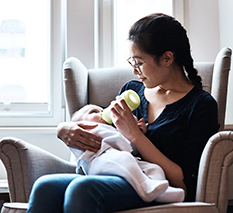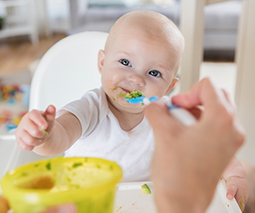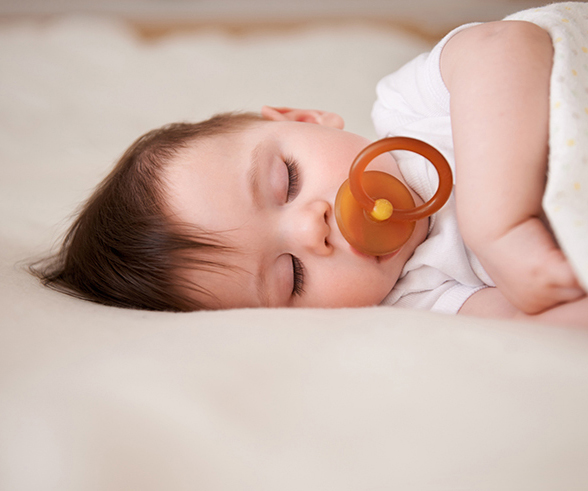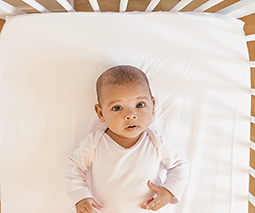Lactation consultant, Pinky McKay answers your top 7 breastfeeding questions

Concerned your baby isn’t getting enough milk? Planning to tandem feed a newborn and a toddler? While breastfeeding is natural, it’s not without its challenges. Luckily, lactation consultant, Pinky McKay shared her professional breastfeeding advice, and some personal experience too, on everything from how to tandem feed to how to continue breastfeeding when you return to out-of-home work. Here’s Pinky’s advice:
Question 1: Is my breastfed baby getting enough milk?
Varina asks: “I have a six-and-a-half-month old baby boy who doesn’t want to drink milk; neither breastmilk nor formula. This started when he was four months old and I was still breastfeeding him. He fed for less than five minutes and it made me worried, so I started to pump to find out how much he was actually drinking at each feed. He was drinking less than 50ml at a time, every four hours. I’ve tried formula, but he hardly drinks 100ml each feed. The doctor said his growth is still average. Is it normal that my baby does not want milk? Should I be trying to give him more milk, and how can I achieve this?”
Pinky says: Pumping isn’t an indicator of how much your baby’s getting from the breast, because an effectively sucking baby will always get more than even a really good quality pump. So your baby is probably getting more if he’s still at the breast. If the doctor’s happy with him and he’s been thoroughly checked, it sounds as though he’s probably doing fine and you don’t need to worry.
Question 2: How can my baby breastfeed when he has a cold and his nose is blocked up?
Amanda asks: “I have been breastfeeding my four-month-old exclusively up until now, but in the past week he’s been under the weather with his first cold which has made him really snuffly and miserable. His cold has made it really hard for him to feed – he tries to latch on, but can’t breathe. He comes off the breast and then tries to feed, then comes off again, over and over. This is exhausting him and making him really distressed. I’m worried that he’s not getting enough milk and that maybe he’s getting dehydrated. I’ve tried offering water in a bottle but he’s not interested. How do I keep feeding him while he is all blocked up?
Pinky says: Babies under six months old shouldn’t be given water because they can develop a condition called water intoxication and it can affect their nervous system, so it’s not good to give young babies water.
Something you can use to clear his nose is a little snot sucker. Before you feed, use it to suck the snot out so that you can get him on the breast. Another thing you can try is putting a little bit of Vicks VapoRub carefully under your arm – be sure to keep it well clear of the nipple. Do it on one side, just to see if he will feed off that side; it might clear his nose a little bit. You can also try sitting in the bathroom with the shower running; a bit of steam can help him cough up a bit of snot. But I think the snot sucker is probably the way to go.
You can offer feeds quite frequently, and if you’re worried about him getting dehydrated, check his nappies to make sure he’s still peeing.
Question 3: How do I go back to breastfeeding exclusively after I’ve introduced the bottle?
Aleksandra asks: “Once you’ve started supplementing with bottles, how do you get out of that cycle and return exclusively to breastfeeding?”
Pinky says: It’s so hard. And I see so many women being advised to top up with formula, then they don’t know how to go back. Or maybe the baby’s having expressed breastmilk and you’re topping up with that. If they’re having expressed breastmilk, you know you’ve actually got enough for them, so you can keep putting them on the breast.
As long as baby’s thriving and gaining weight, if you are supplementing with formula, try dropping 30ml of the formula over a 24-hour period. So maybe at the morning feed when you’ve got a little bit more milk in your breasts, put 10ml less in that bottle of whatever supplement they’re having. And watch them over the next three days – watch to make sure they’re peeing and okay. Then over the next three days, you can go down another 30ml, but just keep an eye on how the baby is going with that. Because there can be different conditions that can affect your milk supply.
Also, for your milk supply – check that your iron levels are good, that your thyroid levels are in balance, and that you’re eating and drinking well. It would also be good to see a lactation consultant and get some one-on-one guidance around dropping those supplements. But you can do it slowly and gradually, rather than going cold turkey.
Question 4: How do I get my baby to burp before I put her down for a sleep?
Amruta asks: “I have a six-week-old baby who just doesn’t want to burp. No matter what I do after and during a feed, she doesn’t burp! Which would be fine, but what keeps happening is that I put her down for sleep after a feed and then 10 minutes later, she wakes up crying. I pick her up and then she burps, so I know she has wind in there. Do you have any suggestions on how to get her to burp before I put her down to sleep?”
Pinky says: Everyone thinks burping is a magic skill, but if you just keep your baby upright and she’s relaxed, often the burp will come up. Hold her upright for about 20 minutes after a feed and she’ll probably be okay. The secret is just not to put her straight down. Give her a bit of time.
The stomach has this little valve and it opens and shuts at the face of the oesophagus. The bubble could be up at the top part, and it’s got to get out of that little hole. So sometimes just sitting your baby on your lap and just changing her position – tilting her backwards and forwards – will often be enough to let that little bubble come out.
Question 5: What are your tips for tandem feeding my newborn and my toddler?
Cassandra asks: “I’m due with my second baby in two weeks, and my firstborn will only be 16 months old. He’s still breastfeeding once or twice a day for comfort. I’m very keen to continue this bond with him until two years of age, as recommended by the World Health Organisation, by tandem feeding. I’ve seen some women have lots of success with tandem feeding and would love to try it. Do you have any tips or advice to help me make the transition work for both my toddler and newborn? I’m unsure if my toddler’s sucking will impact the necessary supply for my newborn. I would love your thoughts on any good techniques or routines to try.”
Pinky says: I tandem nursed my girls, and I found it really hard in the first couple of months. It was almost like my toddler needed to breastfeed every time the baby did and then wanted another feed by herself.
The child who’s sucking will regulate the milk that they need, whether that’s a newborn or not, so feeding the toddler won’t affect the baby’s amount of milk. I’m sure my baby was full of hind milk or something, because she was bonnie and blooming and fat! Some mums who tandem feed say that the newborn can have one side and the older child can have the other, but I really don’t think it matters. The way the baby sucks will regulate the type of milk that they get, so you don’t have to worry about that.
After you give birth, your milk will come in very quickly because you have nursed your toddler through. When I was pregnant, my toddler actually decided that she would have one side and the baby could have the other side, so she only fed off one side during my pregnancy. The side she didn’t feed on completely dried up, then the milk on that side came back as colostrum after I gave birth. It was very interesting. So know that after birth, the release of the placenta and those changing hormones will mean that the baby gets the colostrum; there’s no deprivation for the baby.
But I think doing as much preparation as you can and organising support beforehand is worth it, because you’re going to be stuck on that couch – just like you are when you have a newborn, but it’s like having two newborns!
Question 6: How should I start expressing milk so my partner can feed our baby?
Samira asks: “I’d like to start expressing breastmilk so that my husband can feed bub once a day, but where do I begin? I’m not sure how it works: will pumping more than my baby drinks boost my supply to more than we need? Do I express after a feed, or later, in between feeds? Can I add freshly pumped milk to the milk I pumped previously, until I have enough for a feed? I’m just a bit confused as to how it all works and the best way to get started.”
Pinky says: If your baby’s under six weeks, you’re better off waiting until your supply is really in sync with your baby. There are lots of other ways partners can bond, like baby massages – they are just beautiful because they get that eye contact, they’re really engaging with the baby, and the baby’s brain and their brain really connect. Or having a bath or shower with Dad is also great for that bonding connection.
If you’re going to express, find a time that you can express comfortably between feeds. But really take care because like you say, you can push your supply up to more than you need. And that can be very uncomfortable, especially in the early days when your supply is still settling into syncing between you and your baby.
What you might like to do is express around 9pm at night and give your husband the baby and the bottle. But it’s important to know that you’re also going to need to express at that time, because otherwise you’re going to mess with your supply. So I always think it’s easier for you to breastfeed, and then give the baby to your partner to settle. Your partner can cuddle, settle and bond with the baby. There’s more eye contact changing a nappy than there is giving a bottle.
When it comes to adding fresh milk to milk you’ve already pumped, for 24 hours you can cool the milk and add it to whatever else you’ve got. Some women use little silicon milk collection shells, you can pop them in your bra between feeds, and instead of milk leaking into a pad, you can use the shells to collect the milk and then pop it in the bottle if you want to. Just be really careful that you do not push your milk into oversupply.
Question 7: What are your tips on how to manage breastfeeding when I return to out-of-home work?
Carly asks: “I’m returning to work on Friday, and I need to start pumping a supply for my eight-month-old breastfed baby, as my mother will be looking after her whilst I’m working. At her age, I don’t want to start increasing my milk supply, but would love to continue feeding her until around 12 months of age. She’s currently having three breastfeeds per day and one to two feeds at night. Do you have any advice on when I should pump and how I can manage this? Is it okay if she misses a feed once or twice?”
Pinky says: It’s probably okay if she misses a feed once or twice; she’s going to make up for it when you get home from work. A lot of babies actually reverse cycle and feed a little bit more in the evening or at night. But as long as you feed her before you go to work – get up early, have some time to give her a really nice little feed – then if you can get to your baby at lunchtime or have her brought to you, maybe you could do it then. Or you can express at lunchtime on your break.
Under the Equal Opportunities legislation, employers legally have to support breastfeeding mothers. Know that you can have a room with an electrical outlet for your pump, or you might have a pump that you can charge up beforehand and take with you.
Even if you boost your supply a bit during the week, it’s going to flatten out during the weekend, and you can feed your baby as normal during the days that you’re not working. So it doesn’t make much difference then. I’d suggest starting to get a little stash going now, just so that you feel comfortable when your baby is with your mum. And your mum will feel more relaxed too, knowing that she’s got some breastmilk for your baby.
Watch Pinky McKay answer your questions about baby feeding:
Head over to the Facebook event page for details on all the sessions in our second Q&A series for parents! Get your questions ready for our team of Bub and Me experts to answer live.
The Babyology Masterclass series is sponsored by BIG W, where you can find everything you need for pregnancy, baby and beyond.





